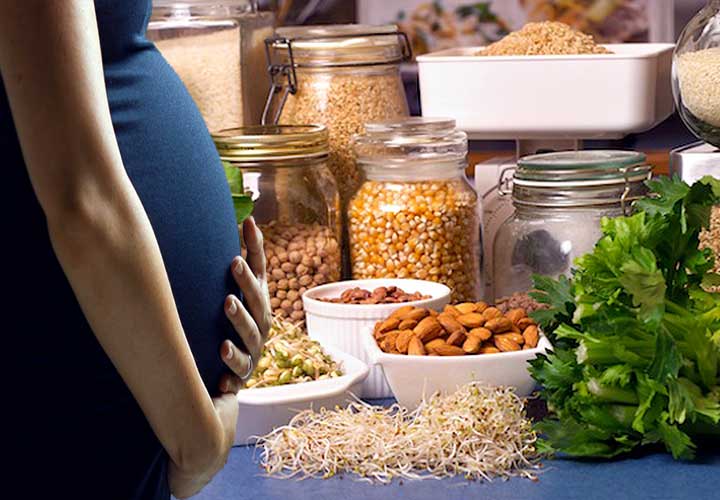The general statement that pregnancy means “eating for two” though superfluous and sweeping is however worth paying some attention to. For some women, they go to the extreme of eating for two and may be for four! And consume all sorts of things with a keen sense of unbridled appetite, eating without control. The end result is that they become overweight probably obese and their babies become too big! These groups of women are at higher risk of developing gestational diabetes mellitus and they are at higher risk of having a difficult labour. The other extreme group of women is those who exhibit very poor appetite while pregnant, the notorious nausea and vomiting of the first trimester prevent them from eating enough for one, not to mention two! The fear of having a “big baby” prevents them from eating adequately in the second and third trimester. The result of this is poor weight gain and extremely small babies with a higher risk of complications and intervention in pregnancy and labour.
The conclusion from the foregoing is that extremes of eating habits are counter productive with bad outcome. Moderation in dietary pattern is the most desired.
I am not advocating that you start measuring out portions to attain moderation. You need to make your diet as natural as possible. So, fresh diet is the best, followed by frozen diet. Quantity wise, you will require extra calories of about 250 extra calories a day. The quality of what you eat is more important than the quantity.
Spread your meals over the day instead of eating “heavy” infrequent meals, it is better to eat “light” frequent meals. This will help with the excessive nausea and vomiting experienced in the first trimester. In terms of quality, note that junk such as fries, hamburgers and chocolate bars don’t benefits the baby much and your body eventually converts it to fat, so don’t binge on them.
A lot of debates exist on if you should take sugar rich foods or not. I am not very rigid on this. I only advice that you avoid “excess” of anything and this includes avoiding excess of sweeteners including white and brown sugar, golden, syrup, saccharine and aspartine. Also avoid “excess” of soft drinks, such as cola and sweetened fruit juice, sweet and chocolate bars, artificial cream, sweetened breakfast cereal, ice cream, and sorbets that contain added sugar, saurries that contain sugar.
In the past peanuts or pea-nut butter used to be linked with allergies but this link has been currently dismissed.
What you should eat is a balance diet with carbohydrates, protein, vitamins and minerals are all necessary.
Protein is the most relevant for your baby as it contains amino acids which are the building blocks of the body. Your body require 20 different types of amino acid. 12 of them are produced by the body (non-essential amino acids). The other 8 must be provided by the food you eat. First class protein found in animal and animal products are a rich source of essential amino acid.
Meat and offals are prototype examples of first class protein. Fish is also another example.
Excessive consumption of liver has been linked to excess vitamin A which may have toxic effects on the baby.
CARBOHYDRATES: Carbohydrates meals constitute what provide most of your calorie and energy requirement throughout your pregnancy. Carbohydrates could be complex or simple. Complex carbohydrates are present in tubers such as yam, pounded yam, starch, garri, eba and amala and other grains. They have to be broken down by the body to simple forms to harness the energy requirements of the body. The combination of these meals with soups in various delicacies will give a salad of other nutrients in the form of proteins, fat, vitamins and other minerals.
Simple carbohydrates provide immediate source of energy, particularly when you are tired. They are readily absorbed by the body. Fruit drinks contain good quantities of fructose. Sugar cane is rich in sucrose. Honey is a good source of glucose and milk gives a good supply of galactose and lactose.
MINERALS: Minerals in the form of calcium, iron and zinc are provided by food such as cheese, milk, fish, yogurt, red meat, cereals, wheat, bran, whole wheat etc. minerals and trace elements help the body to function properly. Iron is responsible for building the blood pigment haemoglobin. While calcium, is required for development of bones. Zinc is necessary for the development of the brain and nervous system of the body.
VITAMINS
The various vitamins required by the body can be produced by vegetables and fruits. Carrots, tomatoes, bananas and cherries are good sources of vitamins. Vitamin B12 supply is best from animal products and dairy diets. Folic acid is crucial to the development of the nervous system of the baby and established evidence has shown that folic acid taken before conception and the first 12 weeks helps to reduce the occurrence of neural tube defect in the baby.

